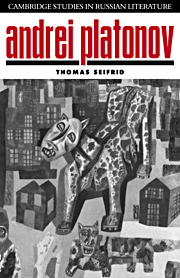Book contents
- Frontmatter
- Contents
- Preface
- List of abbreviations
- Introduction: The problem of reading Platonov
- 1 Consciousness and matter: Platonov in Voronezh and Tambov (1917–1926)
- 2 Learning the language of being (1926–1927)
- 3 Chevengur and the utopian genre
- 4 Platonov and the culture of the Five-Year Plan (1929–1931)
- 5 “Socialist Realist” Platonov (1934–1951)
- Conclusion
- Notes
- Select bibliography
- Index
- CAMBRIDGE STUDIES IN RUSSIAN LITERATURE
2 - Learning the language of being (1926–1927)
Published online by Cambridge University Press: 27 August 2009
- Frontmatter
- Contents
- Preface
- List of abbreviations
- Introduction: The problem of reading Platonov
- 1 Consciousness and matter: Platonov in Voronezh and Tambov (1917–1926)
- 2 Learning the language of being (1926–1927)
- 3 Chevengur and the utopian genre
- 4 Platonov and the culture of the Five-Year Plan (1929–1931)
- 5 “Socialist Realist” Platonov (1934–1951)
- Conclusion
- Notes
- Select bibliography
- Index
- CAMBRIDGE STUDIES IN RUSSIAN LITERATURE
Summary
The innovative configuration of themes, imagery, and verbal devices for which Platonov is best known emerged with striking rapidity over the course of just two years, 1926 and 1927. However, at least two works of this “transitional” phase between Voronezh and Moscow, between careers as an engineer and a writer, directly continue the concerns of Platonov's early literary and publicistic prose. These are the two science fiction tales published in 1926. Both illustrate how the science fiction genre continued to serve Platonov as a forum in which to inject ambivalence into the theme of utopian transcendence of the material world. “Lunnaia bomba” (“The Lunar Bomb”; 1926) dramatizes the notion, probably borrowed from Tsiolkovskii but common to a wide array of Russian utopian thinkers, that man is destined to venture beyond the bounds of earth and colonize outer space. On the level of this ostensible meaning the story may in fact be read as an allegory of transcendence: an engineer named Kreitskopf builds a lunar projectile and has himself flung into space, from whence he transmits back to earth his sometimes ecstatic impressions of what he sees (“Tell everyone I'm near the source of earthly poetry,” he radios at one point; 57).
- Type
- Chapter
- Information
- Andrei PlatonovUncertainties of Spirit, pp. 56 - 98Publisher: Cambridge University PressPrint publication year: 1992



